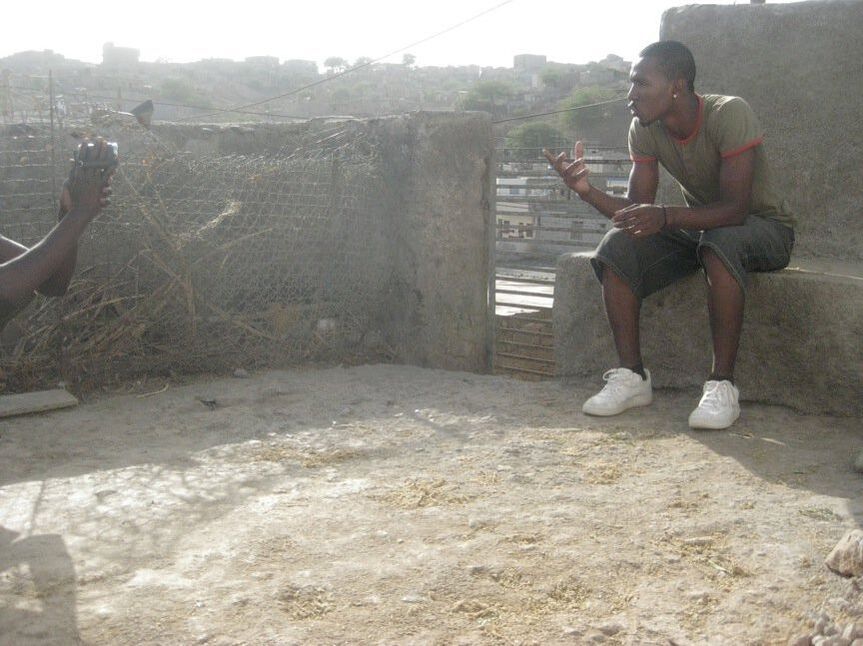|
|
|
The themes of becoming and opposition as identification resonated with me, a white man from the US, as I searched for alliance strategies of anti-racism and anti-essentialism in historically the most creolised part of Europe: Portugal, and more specifically, the capital city of Lisbon.
I had spent the better part of the late 1990s and early 2000s with hip-hoppers, mostly young men of African-Indigenous descent, in the working-class neighbourhoods on the outskirts of São Paulo, Brazil, and considered myself relatively prepared to approach the former metropole of Lisbon as a 'Black' city. During research stints from 2007 to 2013, I realised that the spatial dimensions and historical depth of Blackness were much more complex than I originally had appreciated. In particular, local creole-speaking rappers in Lisbon, Portugal, who identify as Cape Verdean, sometimes Portuguese, sometimes African, occasionally European or even American, tuned me into the predicament and potential empowerment of Blackness: Black time depends on Black space; Blackness as encounter.
Black Studies scholars, such as João Costa Vargas, have argued that colonialism denies any productive historiography for Black people. It is a story of Black death and, even more to the point, the postcolonial reconciliations, such as the famed Brazilian nationalist ideology of 'racial democracy', are worthless 'from the perspective of the Afrodescended' (Vargas 2012, 4). The problem is the colonial and national chronotope, a term referring to the dynamic iteration that combines time and place in the name of collective identity. This chronotope is essentially violent; a necropolitical frame that affords nothing to the Black subject.
This lack of fit or an 'impossible' citizenship, as Vargas calls it, has not gone unnoticed. The need for robust Black chronotopes has motivated millions around the world to question convention and reject a range of social institutions that are essentially racist and uphold white supremacy. My small contribution to this massive movement has been to highlight the vibrant, albeit enigmatic, energy of Cape Verdean Creole, a performative language that voices Blackness as migration and encounter. For me, a big lesson emerged from a tiny locale: Cape Verde, an archipelago island nation off the coast of Senegal. What I learned and described in my Identities article, 'Creole chronotopes: the convergence of time and space in becoming Black', was that race, nation, diaspora, the urban, class and migration patterns are constantly negotiated in Kriolu Rap (see also Lima 2020), both in Lisbon, and in Praia, the capital city of Cape Verde, where I also conducted fieldwork. These created the context for the encounter, in which Cape Verde and the language and identification of creole or kriolu are central. Of course, the encounter is not a singular event; it is contextual and such aspects of time and space are crucial not only to the understanding of the event at the time but also how the encounter is remembered. It is perhaps useful to recall a complementary chronotope: the island nation of Martinique during the 1930s and 1940s. One of the many takeaway messages from negritude thinkers and artists, such as Aimé Césaire and later Frantz Fanon, has been that Blackness is a process of becoming and should be cultivated as a decolonial act, an act against oppression. References: Lima, Redy Wilson. 2020. Di Kamaradas a Irmons: o Rap Cabo-Verdiano e a (Re)Construção de uma Identidade de Resistência. Tomo, 37: 47-88. Vargas, João Costa. 2012. Gendered antiblackness and the impossible Brazilian project: Emerging critical black Brazilian studies. Cultural Dynamics, 24(1): 3-11.
Blog post by Derek Pardue, Aarhus University, Denmark
Read the full article: Pardue, Derek. Creole chronotopes: the convergences of time and place in becoming black. Identities: Global Studies in Culture and Power. DOI: 10.1080/1070289X.2016.1260015
0 Comments
Your comment will be posted after it is approved.
Leave a Reply. |
|
Explore Identities at tandfonline.com/GIDE |
|
The views and opinions expressed on The Identities Blog are solely those of the original blog post authors, and not of the journal, Taylor & Francis Group or the University of Glasgow.

